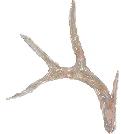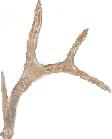Kerr WMA: Deer Research Projects
Effects of Maternal Nutritional Stress on Yearling Antler Production


The goal of this project will be to investigate the effects of nutritional stress (applied during the third trimester of pregnancy) on antler production of yearling male white-tailed deer.
Seven single-sire breeding herds will be established and maintained throughout the duration of the study. Each pen will be comprised of a single male and 10-12 females. Composition of each individual herd will remain the same each year. All herds will be maintained in 2/3-acre pens on the Kerr WMA. Semen will be collected from all sires to ensure continuation of the breeding program should any mortality occur.
The control group of females will be fed an unlimited, 16% protein diet year round. The treatment group will be fed an identical diet during the first year. In year 2, the treatment group will be subjected to a limited, 8% protein diet during the third trimester of pregnancy until weaning. Diet for this group will be alternated annually between the two feed rations. All male offspring will be fed an unlimited, 16% protein diet while producing yearling antlers. At birth, all fawns will be weighed and marked for individual identification and pedigree records will be established.
Data from all male progeny will be collected in October and will include body weight, antler weight, spread, main beam basal circumference and length, and number of points. All males will be placed on an unlimited 16% protein diet after weaning. DNA samples will be collected from yearlings and stored at Texas A&M University for future genetic analysis.
Resultant data will be used to compare antler characteristics among full siblings and between cohorts of the treatment and control groups. Additional comparative information such as survival rates, birth weights, weaning weights and sex ratios will be analyzed. These data will also be used to investigate the variability of antler traits among full siblings.